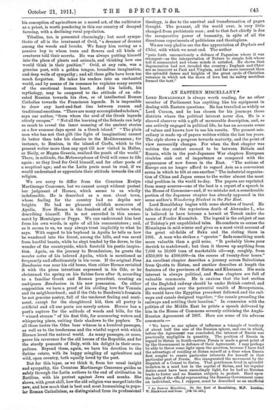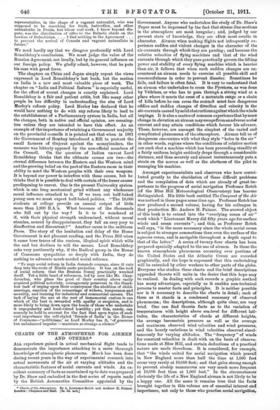AN EASTERN MISCELLANY, LORD RONALDSHAY is always worth reading, for
no other member of Parliament has anything like his equipment in dealing with Eastern questions. He has travelled as widely as Lord Curzon, and he has chosen for his journeys those districts where the political interest never dies. He is a shrewd observer with a gift of memorable description, and, as one actively engaged in political life, he has an accurate sense of values and knows how to use his results. The present mis- cellany is made up of papers written within the last ten years.
The style shows a progress towards maturity, and the point of view necessarily changes. For when the first chapter was written the contest seemed to be between Britain and Russia, while in the post-Japanese War chapters European rivalries sink out of importance as compared with the appearance of new forces in the East. " The nations of Europe can no longer afford to regard Asia as a convenient arena in which to tilt at one another." The industrial organiza-
tion of China and Japan seems to the writer almost the most vital problem in the world to-day. The papers are reprinted from many sources—one of the best is a report of a speech in the House of Commons—and, if we mistake not, a considerable portion of the Japanese chapter has already appeared in the same author's Wandering Student in the Far East.
Lord Ronaldahay begins with some sketches of travel. He tells the story of the mysterious death of Alexander I., who is believed to have become a hermit at Tomsk under the name of Feodor Kuzmitch. The legend is the subject of one of Tolstoy's yet unpublished tales. He conducts us across the Himalayas in mid-winter and gives us a most vivid account of the great oil-fields of Baku and the rioting there in 1905. A man who strikes a " spouter " finds something much more valuable than a gold mine. " It probably blows your derrick to matchwood ; but then it throws up anything from 7,000 to 10,000 tons of marketable oil—say, roughly, from £350,000 to £500,000—in the course of twenty-four hours." An excellent chapter describes a journey across Baluchistan from Quetta to Sistan, and another describes at length the features of the provinces of Sistan and Khurasan. His main interest is always political, and fbese chapters are full of valuable comments. He is anxious that the last section of the Baghdad railway should be under British control, and grows eloquent over the potential wealth of Mesopotamia. He would have the Egyptian precedent followed and the rail- ways and canals designed together, " the canals preceding the railways and settling their location." In connexion with the politics of the Middle East he prints a speech delivered by him in the House of Commons severely criticising the Anglo- Russian Agreement of 1907. Here are some of his adverse comments :—
" We have as our sphere of influence a triangle of territory of about half the size of the Russian sphere, and one in which, before the Agreement was concluded, the interest of Russia was practically negligible in quantity. The position of Russia in regard to Sistan in South-eastern Persia is made a great point of by the Government in defence of their Agreement. I may perhaps be able to throw some light upon the question, because I have had the advantage of residing at Sistan myself at a time whon Russia first sought to create particular interests for herself in that particular part of Persia. She inaugurated the movement by the dispatch of a Consul to Sistan. That gentleman lived in splendid isolation in a mud but in the capital of Sistan, and his regular duties must have been exceedingly light, for he had no Russian trade to foster and no Russian subjects to protect. Hard upon the heels of the official representing the Russian Government came an individual, who, I suppose, must be described as an unofficial • An Eastern Miscellany. By the Earl of Bolialdehay, M.P. London; W. Blackwood and Sons. [Ws. 6d. set) representative, in the shape of a vagrant naturalist, who was supposed to be searching for birds, butterflies, and other animalcebe in Persia, but whose real work, I know beyond dis- pute, was the distribution of rifles to the Baluchi chiefs on the borders of Baluchistan. . . . I find nothing in the Agreement . . . to prevent the arrival of Consuls and vagrant naturalists in future."
We need hardly say that we disagree profoundlY with Lord Ronaldshay's conclusions. We must judge the value of the Russian Agreement, not locally, but by its general influence on our foreign policy. We gladly admit, however, that he puts his case with greet force.
The chapters on China and Japan simply repeat the views
expressed in Lord Ronaldsbay's last book, but the section on India is a new and most valuable piece of work. The chapter on " India and Political Reform " is especially useful, for the effect of recent changes is exactly explained. Lord Ronaldshay is a fair and patient critic, but like many other people he has difficulty in nnderstanding the aim of Lord
Morley'S reform policy. Lord Morley hat declared that he would have nothing td do with any reform likely to lead to the establish sent of a Parliathentary system in India, but all
the changes, both in native and Official opinion, are meaning- less unletre they are intended to have this effect. As an example of the iinpOrtarice of retaining a Government majority on the provincial councils it hi pointed ant that when in 1891
the Government of Boinbay introduced a Bill to protect the small fanners of Gnjerat against the moneylenders, the measure was bitterly opposed by the non.official members of the Council. Oil the question Of Indian unrest Lord Ronaldshay thinks that the ultimate causes are two—the eternal difference between the Eastern and the Western mind and the growing belief on the part of the Eastern races in their ability to meet the Western peoples with their own weapons. It is beyond our power to interfere with these causes, but he thinks that it is poSsible to deal with certain of the lesser causes predisposing to unrest. One is the present University system
which is one long mechanical grind without any wholesome moral influence attached to it. If we turn out half-baked young men we must expect half-baked politics. " The 18,000 students at college provide an annual output of little more than 1,900 B.A.'s. What becomes of the thousands who fill out by the way ? Is it to be wondered at if, with their physical strength undermined, without moral stamina, soured by disappointment, they fall an easy prey to disaffection and discontent F" Another cause is the seditious Press. The story of the hesitation and delay of the Home Government is not pleasant reading, and the Press Bill when it came bore traces of the curious, illogical spirit which wills the end but declinei to will the means. Lord Ronaldshay asks very pertinently why, if the Radical group in the House of Commons sympathize so deeply with India, they do nothing to advocate much-needed social reforms.
" To urge social reform in India demands courage, since it cuts deep into the roots of Hindu casts prejudice. It was on the rock of social reform that the Brahma Somaj practically wrecked itself. Yet a little band of reformers, led by men like Mr. Chan- davarkar, who place the good of their country above easily acquired political notoriety, courageously persevere in the thank- less task of urging upon their countrymen the abolition of child- marriage, sanction of the remarriage of widows, temperance and morality, and training for industrial and commercial careers. The task of laying the axe at the root of immemorial custom is one which at the best is rewarded with ape* or suspicion, and is more likely to bring down Upon the heads of those who undertake it unpopularity and loud-voiced hostility ; yet this, surely, can scarcely be held to account for the fact that upon topics of such vast importance the self-styled 'friends of fndia' in the House Of Commons—' politicians,' as Lord Morley has it, ' of generous but unbalanced impulse '—maintain so strange a silence."















































 Previous page
Previous page